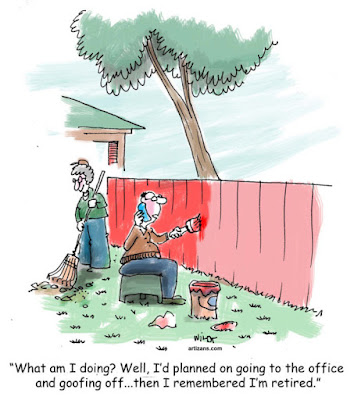In
every line of work there are aspects that are less likable. Some of these “unlikables”
are universal, but most are not. (You’d think that cleaning toilets, for example,
would be one of the universally despised tasks, but I have known more than one
person who didn’t feel this way.)
But
then there are the things people love about their job. Perhaps it’s their
co-workers, or the way they can look with satisfaction at what they have
done/made/accomplished at the end of the week, or the challenge of the work
itself.
No
matter what, the closest way I find to gauging how much one loves what they do is,
barring the need for money, if they do or don’t wish to retire.
I
thought about it the other day, when one of my doctors (the internist I see for
general checkups who is universally adored by her patients) told me she hopes
to retire soon. She isn’t old, not by MDs standards, for they have no mandatory
retirement age.
My
dermatologist, who is at least twenty years older than my GP, told me he can’t
imagine retiring. He loves his work.
I
thought about it again when a writing colleague who’s a gifted and published writer
said she was done writing. She’s now a retired writer. It has been a rewarding
and enriching journey, but she was done.
Writers,
like doctors, don’t have to retire. Writing is separate from publishing,
because most writers are never published. This isn’t (for the vast majority) a
matter of money.
It
is all about how much you love what you do.
If
money considerations were not in the mix, would you:
1. Retire
right now
2. Never
retire
3. Not
sure. Not retire now but can see retiring from your work in the future
I
am guessing (it isn’t more than a guess, no statistics worth quoting here) that
most people would retire yesterday if money were not an issue.
That
is plumb sad.
Count
yourself lucky if, like my dermatologist, retirement holds no charm for you.




